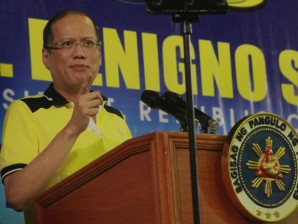MANILA, Philippines—The results of the midterm election have provided President Benigno Aquino III with the chance to accelerate political and economic reforms that hold the key to sustained economic growth and poverty reduction, according to a think-tank group.
Victor Andres C. Manhit, president of the advisory and research consultancy group Stratbase Research Institute, said with President Aquino’s allies dominating both the Senate and the House of Representatives, he “now has a greater opportunity to address pending issues on reforms that will increase investments, directly generate jobs and sustain the economic momentum.”
In the group’s online publication Spark, Manhit said opening the economy to foreign investments and improving the manufacturing and agriculture sectors would generate thousands of jobs for Filipinos and lift them out of poverty.
Manhit said that despite the current economic growth, the manufacturing sector shrank in 2012 to its lowest level as a percentage of the economy in 60 years, while the agriculture sector is now just a tenth of the gross domestic product (GDP).
“All the basic economic sectors, except services, are not being as productive. In a country whose poorest and most of the population are tied to and dependent on agriculture, fisheries and manufacturing, this should be a most alarming concern,” Manhit said.
Citing data from Ibon Foundation, Manhit said the share of manufacturing in GDP fell to 22 percent in 2012 while agriculture’s share shrank to 11 percent.
Manhit said the political gains of Aquino in the recently held midterm elections provide an opportunity to advance critical economic reforms to boost investments in manufacturing and agriculture.
The latest issue of Spark, titled “Looking Back and Moving Forward: Matuwid na Daan?” seeks to juxtapose the significance of the 2013 midterm elections with the gains made by government along the nation’s path to growth and development.
Manhit said despite the Aquino administration’s inclusive growth strategy, the economic growth over the past two years was described by many as a “jobless growth.”
“A key indicator in this regard is employment and job statistics suggest that all may not be too rosy still for the country,” he said.
Official unemployment rate as measured by the National Statistics Office averaged 7 percent in 2011 and 2012.
“We are supposed to be the second fastest growing economy in the region just behind China but the official jobless rates of our neighbors are much lower. Thailand’s is 0.7 percent; Singapore, 2.1 percent; Malaysia, 3 percent; South Korea, 3.8 percent; China, 4 percent; and Taiwan, 4.2 percent,” he said.
Manhit said a review of the Constitution was needed to remove barriers that make the country uncompetitive for new investors.
“These new reforms should focus on creating an environment that will drive new investments that will generate badly needed jobs and supplement an already strong consumption-driven economy. To sustain growth, real jobs must be generated by more investments in enterprises that can tap into our available labor market,” he said.
The Foundation for Economic Freedom, he said, discovered that growth had been propelled by consumption spending, mainly due to remittances of overseas workers and not by any action of the government.
Manhit said President Aquino should take advantage of his leadership popularity to “hasten reform legislation and thus more effectively direct other capitals toward productive restructuring of the national economy.”
Stratbase provides clients with snippets of the economic and political developments in the country on a quarterly basis.
